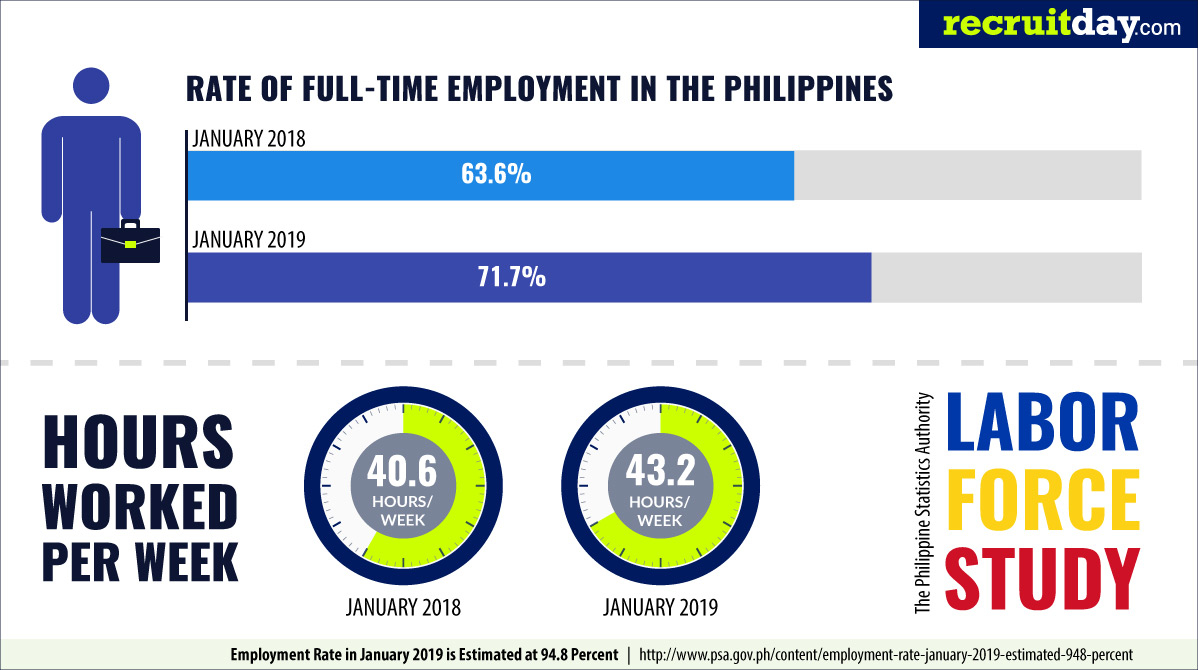EMPLOYERS/HR
WEEKLY WORK HOURS ARE RISING IN THE PHILIPPINES (BUT IT’S NO CAUSE FOR WORRY)
AUGUST 20, 2019

Weekly work hours in the Philippines are rising, but interestingly enough, Filipinos are actually looking to work more and to grab better employment opportunities.
The Growth of Full-time Employment
As the economy grows and greater opportunities come into play, the Philippines continues to rise as the next “Asian Tiger” that it has always been expected to be. One of the most telling and measurable aspects of this growth are the statistics on employment.
According to the Labor Force Survey of January 2019 from the Philippine Statistics Authority, 71.7% of the workforce in the Philippines were working full-time, while only 27.7% were reported to be part-time. This is a significant increase from the previous year where 63.6% were full-time and 35.2% were part-time. This increase in full-time employment translates to more participation in the world economy and a related increase in the GDP.
Additionally, with a steady increase of overall employment to 94.8% the future looks bright for employment opportunities in the country.
A Desire to Work Even More
An effect of the growth of full-time employment is a rise in working hours from an average 40.6 hours per week in January 2018, to 43.2 hours per week in January 2019. Given the conventional 40-hour work week, this figure points to an increased willingness and desire among more Filipinos to work beyond the established norm.
Despite the increase in hours and workload, Filipinos still want more. The desire for more hours has not decreased even as the number of underemployed remains at 15.6%. Underemployed persons are those who “express the desire to have additional hours of work in their present job, or to have an additional job, or to have a new job with longer working hours.” In the Philippines in January 2019, 48% of those who fall under this category were those who already work 40 or more hours in a week.

The key word is desire. People want to work more. These aren’t people who are forced to work overtime or are forced to render more hours. These are people who are actively looking for more opportunities and are actively looking for ways to secure those opportunities.
They are motivated by the desire to support their families, advance their careers, and build a more stable future. The Filipino’s resilience amidst hardship, calamities, and generally poor services is legendary. Filipinos only work harder during the bad times - and there have been many.
All this is to say that the industriousness and heart of the Filipinos always emerge but perhaps this time these are being reciprocated and rewarded in a more stable and stronger economy.
Opportunities on the Horizon
Companies and even the government see this desire and are rising to meet the needs of the workers. More businesses are being set up, providing more employment opportunities to the rising population. The government is working to provide solutions for alternative working environments to offer more flexibility with regard to employment arrangements. Examples of this are the initiatives for compressed work weeks and telecommuting which have arisen according to the House Bill 5068 and the Republic Act 11165 respectively.
These departures from traditional working arrangements are meant to increase productivity and provide more rewarding and meaningful work for this generation of Filipinos. The future looks bright indeed for one of Southeast Asia’s fastest growing economies.
AUGUST 20, 2019
Looking for tech talents to join your team?
Let our team help you recruit, connect, and hire only the best people for your tech job openings. Send an inquiry now!


